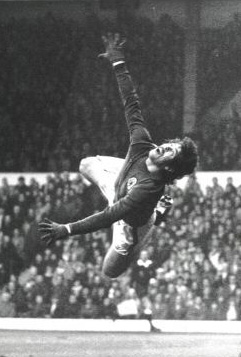

Harvey: David
1965-80&1983-85
(Player Details)
Goalkeeper
Born: Leeds: 07-02-1948
Debut: v West Bromwich Albion (h): 13-10-1965
5í11Ē 12st 3lb (1972)
#31 in 100 Greatest LUFC Players Ever

Harvey was educated at Foxwood and Seacroft Grange Schools in Leeds and represented the
Leeds City Boys at Schoolboy level and worked at the Stylo shoe factory for two weeks before
signing as a professional in February 1965 after a couple of years as an apprentice. There is
a popular myth that if Don Revie had brought David Harvey into the team earlier, then Leeds
might have won more trophies and it has been alluded that Revie made that admission in later
years. It would have been a great testimony to a keeper whose patience was rewarded with
honours for Leeds and Scotland. In fact, Gary Sprakeís brilliance had kept him in the Reserves
and he made about two hundred appearances in the Central League before winning a regular
first-team place in 1971-72, when he played in Unitedís 1972 FA Cup-winning side. It was a
fine turn-around for the patient keeper who had been available for transfer for £40,000 in
November 1971 after being listed by boss Don Revie since that February. However, in early
1972, Harvey opted to stay loyal to Leeds and asked to be taken off the transfer list and it
proved a wise decision when a knee injury to Sprake prior to the F.A. Cup Semi-Final with
Second Division Birmingham City at Hillsboprough on 15th April 1972 marked the beginning of
the end for the Welshman, who played just one League game in 1972-73. A formidable presence
in the famous Wembley showpiece against Arsenal, Harvey was also a sure and steady last line
of defence as Leeds embarked on their record twenty-nine game unbeaten start to the 1973-74
League campaign as Leeds became the talk of the football world. An unfortunate car accident
in February 1975 did see him lose his place to David Stewart and miss out on a European Cup
Final appearance at the end of 1974-75 campaign and he shared goalkeeping duties with his
fellow Scottish international for a few seasons before re-establishing himself as permanent
first-choice before he eventually moved to Canada in 1980. Although born in Leeds, his father
had been born in Ayrshire and he qualified to play for Scotland, and after his career took
off, he was capped by Scotland, playing his first game in the World Cup Qualifier in a 2-0
win over Denmark at Hampden Park on 15th November 1972. After an excellent season in 1972-73,
in which he played sixty-three games, only missing one, he finished up with nothing to show
for his endeavours as United finished third in the League, behind Liverpool and Arsenal, and
in a desperate few days lost 1-0 to underdogs Sunderland in the FA Cup Final and AC Milan in
the European Cup-winners Cup Final. Harvey was outstanding as Leeds won the 1973-74 League
championship and earned Harvey a First Division Champions medal to go with his FA Cup
winnerís medal gained two years previous. He was rated the best goalkeeper in the 1974 World
Cup in Germany, as he kept a clean sheet against Brazil and Zaire, but though never losing a
game, Scotland were eliminated on goal difference before the knock-out stages. He finished
with sixteen full caps for his adopted Scotland, playing his final game in the 6-0 rout of
Finland at Hampden Park on 8th September 1976. Despite missing the vital penalty in the
shoot-out at the end of the Charity Shield Cup game with Liverpool, Harvey was set for a
long run in the Leeds goal, before a bad car accident in February 1975 cost him the chance
of playing in the 1975 European Cup Final against Bayern Munich. Harvey joined Vancouver
Whitecaps in the NASL for £40,000 in 1980 and he was later joined by Leeds players, Ray
Hankin, Terry Yorath, Peter Lorimer and John Giles was the manager for a couple of years. A
phone call from Eddie Gray, Manager of Leeds at the time, asking him to go back for a year
saw Harvey answered the call, aged thirty-three, to be understudy to John Lukic, and he
finished up being there for four years. He did return briefly to Elland Road in December of
that year before going back to Vancouver via Irish side, Drogheda, in 1980-81. He left
Canada for Leeds again in March 1983, aged thirty-five, and remained a first team regular
until going on loan to Partick Thistle in February 1985, where he played just one game. He
played ten games in 1980, four games in 1981 and five in 1982, a total of nineteen games
for the Whitecaps. He was granted a Testimonial by Leeds and it was played against Vancouver
Whitecaps at Elland Road on 16th March 1980. His tally of United first-team appearances is
remarkable when it is considered how many games he also played for the Reserves. Having
played under Allan Clarke in his first spell at Leeds, he completed a hat-trick of Managers
at Leeds, who had been old teammates, as Eddie Gray and Billy Bremner took over the reigns
at Elland Road. He added another when he joined Trevor Cherry at Valley Parade. He appeared
six times for Bradford City before going to Whitby Town as player-manager in May 1985, a
post he held until the summer of 1986. There he brought in ex-Leeds players Ray Hankin,
Steve Balcombe and Eddie Gray and Town progressed to the Second Round of the F.A. Cup by
defeating South Liverpool on 16th November 1985, when Ray Hankin's goal was enough to see
the Blues through to face York City in the Second Round, but they went down 1-3 at Bootham
Crescent on 7th December 1985. He then had a short spell at Scottish club Morton, where he
played three games. In 1987 he was with Harrogate Town and signed for Carlisle United on a
non-contract basis in 1987-88. He came out of football and had a variety of occupations
including running a pub in Harrogate for three years, delivering fruit and vegetables to
hotels in the Harrogate area, being a postman in Knaresborough and, finally moving to a
farmhouse and smallholding on the island of Sanday in the Orkneys, where he was also the
postman. During Christmas in December 2009, the sixty-one year old Harvey fell ill at his
home in the Orkney Islands and he had to be airlifted to Edinburgh for hospitalisation,
where he was diagnosed as having had an heart attack. He underwent a quadruple heart
bypass operation which was successful and he made a complete recovery and was able to
return to his duties as a postman.